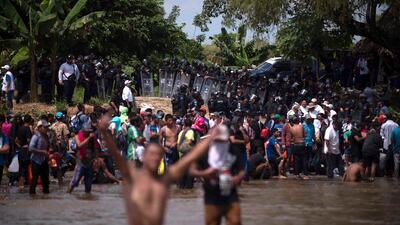As Americans head to the midterm polls today, they do so in the face of an existential threat. That, at least, has been the narrative pushed by the nation's right-wing media about the "migrant caravan" now making its way north from the violence-plagued towns of Central America.
The caravan comprises between 3,000 and 4,000 migrants, predominantly from Honduras, El Salvador and Guatemala, many making the arduous, thousands-of-kilometres-long journey on foot to the United States. Yesterday, they arrived in the capital of Mexico, still hundreds of kilometres from the nearest US border crossing.
Nevertheless, this issue has become a political football in the United States, folding into a febrile discourse about immigration, security and borders. Donald Trump called the caravan "an invasion", and sent thousands of troops to the border. He has not explained why a nuclear-armed country of 300 million should be so afraid of a few thousand desperate and downtrodden people.
The language being used in the United States demonstrates a continued securitisation of immigration; the way people seeking opportunities for a better life have been discussed only in the context of the purported dangers they pose. The same language was employed during to the so-called European "refugee crisis", which resulted largely from the Syrian war. In both cases, the focus has been on who those trying to enter are, not the reasons they fled their homes in the first place.
The reality of this procession of families is almost unimaginable. Across huge distances, through day and night, mothers, fathers and children, including babies, brave bad weather, illness, lack of food, and the sheer exhaustion of walking for many hours at a time, simply to seek safety. Barely any of the stories behind this astonishing migration make it into the American media, and even fewer into America’s political discourse.
The same was true of the refugee crisis in Europe, a movement of people so vast it was unprecedented in the modern world. Crimes committed by a minuscule percentage of those displaced people became distorted through space and time. What crimes had they committed in their home countries? What crimes had others committed after being offered asylum? What crimes might they commit in the future? Pressed together into one homogenous group, the lives of the many who were seeking refuge from some of the worst abuses imaginable were defined by the acts of the few.
It is true that among those seeking refuge in Europe and the Middle East, some people had committed crimes, and sometimes in the service of the regimes they were leaving behind. There have been horrific stories of former prisoners of ISIS meeting their captors on European streets. In the midst of the Syrian war, or those of the Balkans or Africa, from which other migrants came, truly horrendous acts have been perpetrated. These risks are real, and it is not unreasonable for potential host countries to exercise caution.
Yet the real reason why such large numbers of people were making their way to Europe was rarely discussed, as is the case in the United States today.
Although it was understood that the majority of refugees were fleeing the war in Syria, it was hardly ever mentioned that the next-highest numbers were coming from Afghanistan, Iraq and Pakistan – all countries western forces had recently carried out air and drone strikes against. In other words, a vast number of those coming to the West were doing so to escape the weapons of the West itself.
The conversation gets distorted in other ways, too. In the US, Mr Trump announced that he would send around 7,000 troops to the nation’s border with Mexico, more than are currently in Iraq and Syria combined. In Europe, even at the height of the refugee crisis, there were more Syrian refugees in Istanbul, that in the entirety of the European Union.
Such manipulations can also be seen in the way the “burden” of migrants and asylum seekers, two discrete categories that are often wrongly conflated, is presented. Those who migrate − “young, strong men”, in Mr Trump's telling − are simultaneously responsible for taking jobs from local people, while at the same time living off the state. This is obviously a fiction.
Such misrepresentations are designed to appeal to emotions of fear and anxiety. The language of security is the language of division. At its root is the idea that anyone who migrates to a new country is doing so with the express intention of causing harm, be it economic, social, or acts of outright terrorism. The reality is that in the overwhelming majority of cases, this is far from the truth.
Far better to replace the language of security with the language of community. The Syrian war was rightly seen by some as a threat to the whole of the Middle East and its neighbours in Europe. The solidarity that EU states demanded from each other should have been extended beyond their borders. After all, it was only relatively recently that refugees from the Balkan wars were pouring into countries such as Turkey.
The same is true of the migrant caravan. Most of its members are part of it because they have nowhere else to go, or because they wish to build a brighter future. Their aim is to become a valuable part of American life, not to undermine it. For those leaving Central America, as for those from Syria, the focus should not be on the fact that that they are heading to our homes; it should be on why they so fear staying in their own.


